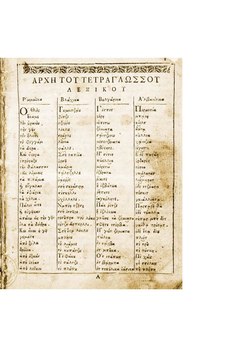Lexicon Tetraglosson
It has been suggested that this article be merged into Daniel Moscopolites. (Discuss) Proposed since March 2023. |
Lexicon Tetraglosson (Greek: Τετράγλωσσον Λεξικόν), (Bulgarian: Речник на четири езика), was a dictionary of four languages as part of the Εισαγωγική Διδασκαλία[a] (Romanised: Eisagogiki Didaskalia; lit. 'Introductory Education') created by Daniel Moscopolites a Aromanian scholar from Moscopole.
Dictionary
Daniel, created the Εισαγωγική Διδασκαλία ("Introductory Instruction")[2] and compiled a combined dictionary of Greek (Romaika), Aromanian (Vlachika), Bulgarian (Vulgarika) and Albanian (Alvanitika) to motivate non-Greek speakers with this dictionary to learn the Greek language:[3]
Albanians, Vlachs, Bulgarians, speaker of other languages, rejoice, and prepare yourselves all of you to become Greeks (Romioi), leaving the barbarian language, voice and customs, that to your descendants will appear like myths.
The book was printed in 1794 in Venice. The Albanian, Aromanian and Bulgarian translations were written in the Greek alphabet. The Bulgarian part of the dictionary is regarded as the earliest dictionary of Bulgarian.[1] Modern Macedonian authors see the Bulgarian part of the dictionary as the Macedonian language.[b][4][5] This part was provided and translated by Pop Stefan, an 18th-century sakellarios living in the city of Ohrid who was a friend of Daniel and of Aromanian descent as well.[6][7] Pop Stefan is the progenitor of the current notable Ohrid family Pop Stefanija who reside in that city to this day.[8]
By looking at the correspondence between Pop Stefan and Daniel Moscopolites,[9] it is known that they were close friends and that Pop Stefan translated the text.
Daniel's first letter is dated April 13, 1793. The printing of the Lexicon Tetraglosson took place the following year. Here is what the letter says:
"Here with Demetrius I am sending you a short dictionary for you to translate into Bulgarian and I beg you to put in the effort to finish it in a week. After easter I want to send it to Venice to be printed.Be careful so that no mistake will be made. For this favor I am thankful and I owe you."
Who Dimitrius is, is learned from the second letter dated April 30, 1793:
"Brother Sakellarios, if you love me, now that my student, the venerable Mr. Dimitrios of Pope Ioannou, has arrived to become a teacher of the children of Ahridos, please support him in everything and take him under your wing. He is worthy and humble and I hope will prosper because he has lived with us and imitated our manners."[10][11]
His full name was Dimitrius of Ioannou from Moscopole. By the correspondence it is known that Dimitrius was a student in Ohrid under the wing of Pop Stefania. Afterwards he went to Magarevo and became a priest there.
It is known that Pop Stefan was so fond of his pupil that hen welcomed him into his family and Dimitrius married Pop Stefan's granddaughter of his oldest son, Nikola Pop Stefania. They had a daughter together. Her name was Sultana and she was the mother of Dimitar and Konstantin, the famous Miladinov brothers who were poets and activists from Struga.[12][13]
Pop Stefan and Daniel Moscopolites remained good friends. He said about the Sakellarios that "his golden mouth gathered what the muses gave". They met on the market of Struga where Daniel, later in life, lived until his death in 1825.[14]
The Lexicon was reprinted in Bulgaria in 1841.[15]
Notes
- ^ Full title: Εισαγωγική Διδασκαλία περιέχουσα Λεξικόν Τετράγλωσσον των τεσσάρων κοινών διαλέκτων, ήτοι της απλής Ρωμαϊκής, της εν Μοισία Βλαχικής, της Βουλγαρικής και της Αλβανικής; (lit. 'Introductory education, containing a dictionary of four common languages, being Colloquial Greek, Wallachian of Moesia, Bulgarian and Albanian').[1]
- ^ The adjective "Macedonian" for referring to the language and the people who spoke it appeared only in the 1850s, at least 56 years after Daniil published the Tetraglosson.[4]
References
- ^ a b Sampimon, J. (2006). Becoming Bulgarian: the articulation of Bulgarian identity in the nineteenth century in its international context: an intellectual history. University of Amsterdam. p. 43.
- ^ Central European University Press. Discourses of collective identity in Central and Southeast Europe (1770–1945): texts and commentaries. Central European University Press, 2006 ISBN 978-963-7326-52-3, p. 67.
- ^ Kostantaras Dean J.. Infamy and revolt: the rise of the national problem in early modern Greek thought. East European Monographs, 2006, ISBN 978-0-88033-581-2, p. 96.
- ^ a b Kamusella, Tomasz (2008). The Politics of Language and Nationalism in Modern Central Europe. Springer. p. 248. ISBN 978-0-230-58347-4.
- ^ Kocheva, Ana; Choleva-Dimitrova, Anna; Micheva, Vanya; Nikolov, Georgi; Vasileva Lilyana; Antonova-Vasileva, Luchia; Kaytchev, Naoum; Pavlov, Plamen; Barlieva, Slavia; Keremidchieva, Slavka; Tashev, Spas; Aleksandrova, Tatyana (2020). On the Official Language of North Macedonia Prof. Marin Drinov Publishing House of the Bulgarian Academy of Sciences. p. 36
- ^ "Ничев, Александър. Четириезичният речник на Даниил (гръцка и българска част). Годишник на Софийския университет. Факултет по западни филологии, т. LXX, София, 1976, стр. 5-180.
- ^ J. Kristophson, Das Lexikon Tetraglosson des Daniil Moschopolitis, in: Zeitschrift für Balkanologie, 10 (1974), pp. 7–128.
- ^ Ив. Снѣгаровъ. Македонски Прегледъ. Година I, книга 4, София, 192. II p. 56
- ^ Вж. у мене „Нови данни за българщината въ Македония”, сп. „Македонски прегледъ”, год. I, кн. 4, стр. 55—56 и рецензията на Л. Милетичъ, сѫщо тамъ, стр 105—106.
- ^ Ив. Снѣгаровъ. Македонски Прегледъ. Година I, книга 4, София, 192. II p.56
- ^ Προδημοσίευση: Δανιήλ Μοσχοπολίτης “Το Τετράγλωσσον Λεξικόν” / Εισαγωγή, επιμέλεια Γ. Έξαρχος. 13.01.2022
- ^ "Izbor" - Konstantin Miladinov. Gane Todorovski, 1980 Misla Publishing. Page 366 & 395.
- ^ Documentary about the Miladinovci brothers by poet, journalist and author Jovan Negrieski, Radio Struga 2011
- ^ Литературен збор Volume 36 - 1989 - page 29.
- ^ Bardu, Nistor (2007). "Eighteenth Century Aromanian Writers: the Enlightenment and the Awakening of National and Balkan Consciousness". Philologica Jassyensia. III (1 (05)): 93–102. ISSN 1841-5377.
External links
- Εισαγωγική Διδασκαλία (Introductory instruction), 1802

